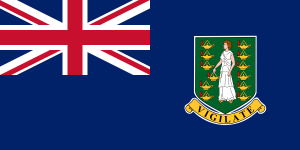Language/Virgin-islands-creole-english/Grammar/Negation
Hi Virgin Islands Creole English learners! 😊
In this lesson, we will learn about negation in Virgin Islands Creole English. We will cover the different types of negation, and provide examples.
At the end of this lesson, you will be able to understand and use negation in Virgin Islands Creole English. So let's get started! 😎
Don't hesitate to look into these other pages after completing this lesson: Pronouns, Give your Opinion & How to Use Be.
Negative Adverbs[edit | edit source]
In Virgin Islands Creole English, we use negative adverbs to create negative sentences. Here are some examples of negative adverbs:
| Virgin Islands Creole English | Pronunciation | English |
|---|---|---|
| No | /no/ | No |
| Not | /nat/ | Not |
| Never | /nevər/ | Never |
| Nah | /na/ | No |
| Ain't | /eɪnt/ | Am not/are not/is not |
We use negative adverbs to negate verbs and sentences. Here's an example:
- Positive sentence: He is happy.
- Negative sentence: He is not happy.
Negative Verb Constructions[edit | edit source]
In Virgin Islands Creole English, we can also negate verbs using different constructions. Here are some examples:
Using "don't"[edit | edit source]
We use "don't" to create negative sentences in the present tense for the first and second person singular and plural, and third person plural. Here's an example:
- Positive sentence: I speak English.
- Negative sentence: I don't speak English.
- Positive sentence: You play football.
- Negative sentence: You don't play football.
- Positive sentence: They live in New York.
- Negative sentence: They don't live in New York.
Using "isn't/aren't"[edit | edit source]
We use "isn't" and "aren't" to create negative sentences in the present tense for the third person singular and second person plural, and first person plural. Here's an example:
- Positive sentence: She is a doctor.
- Negative sentence: She isn't a doctor.
- Positive sentence: We are friends.
- Negative sentence: We aren't friends.
Using "wasn't/weren't"[edit | edit source]
We use "wasn't" and "weren't" to create negative sentences in the past tense for the first, second, and third person singular and plural. Here's an example:
- Positive sentence: I was at the party.
- Negative sentence: I wasn't at the party.
- Positive sentence: They were happy.
- Negative sentence: They weren't happy.
Using "haven't/hasn't"[edit | edit source]
We use "haven't" and "hasn't" to create negative sentences in the present perfect tense for the first and second person singular and plural, and third person plural. Here's an example:
- Positive sentence: I have seen that movie.
- Negative sentence: I haven't seen that movie.
- Positive sentence: You have read that book.
- Negative sentence: You haven't read that book.
- Positive sentence: They have traveled to Europe.
- Negative sentence: They haven't traveled to Europe.
Using "hadn't"[edit | edit source]
We use "hadn't" to create negative sentences in the past perfect tense for all persons. Here's an example:
- Positive sentence: I had finished my work.
- Negative sentence: I hadn't finished my work.
Double Negatives[edit | edit source]
In Virgin Islands Creole English, double negatives are commonly used to emphasize the negativity of a sentence. However, double negatives are not considered standard English grammar. Here's an example:
- Positive sentence: I didn't see anyone there.
- Double negative sentence: I didn't see nobody there.
Dialogue[edit | edit source]
- Person 1: You don't like pizza? (/ju dənt laɪk pit͡sə/ = You don't like pizza?)
- Person 2: No, I don't. (/noʊ /aɪ doʊnt/ = No, I don't.)
Conclusion[edit | edit source]
That's it! Now you know how to form negative sentences in Virgin Islands Creole English. To improve your Virgin Islands Creole English Grammar, you can also use the Polyglot Club website. Find native speakers and ask them any questions!
If you want to learn more about Virgin Islands Creole English Grammar, please check out our Grammar section. Thank you for learning with us today! 😊
➡ If you have any questions, please ask them in the comments section below.
➡ Feel free to edit this wiki page if you think it can be improved. 😎
Sources[edit | edit source]
Great work on completing this lesson! Take a moment to investigate these connected pages: Say Hello and Greetings in Virgin Islands Creole English, Plurals & How to Use Have.

